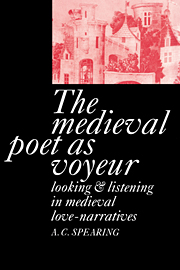Book contents
- Frontmatter
- Contents
- Preface
- 1 Theories of looking
- 2 Examples of looking
- 3 The Tristan story
- 4 Chrétien de Troyes
- 5 The Lanval story
- 6 Troilus and Criseyde and The Manciple's Tale
- 7 Partonope of Blois
- 8 The Knight's Tale and The Merchant's Tale
- 9 The Squyr of Lowe Degre
- 10 The Romaunt of the Rose
- 11 The Parliament of Fowls and A Complaynt of a Loveres Lyfe
- 12 The Palice of Honour and The Goldyn Targe
- 13 The Tretis of the Twa Mariit Wemen and the Wedo
- 14 Phyllyp Sparowe
- Notes
- Bibliography
- Index
- Frontmatter
- Contents
- Preface
- 1 Theories of looking
- 2 Examples of looking
- 3 The Tristan story
- 4 Chrétien de Troyes
- 5 The Lanval story
- 6 Troilus and Criseyde and The Manciple's Tale
- 7 Partonope of Blois
- 8 The Knight's Tale and The Merchant's Tale
- 9 The Squyr of Lowe Degre
- 10 The Romaunt of the Rose
- 11 The Parliament of Fowls and A Complaynt of a Loveres Lyfe
- 12 The Palice of Honour and The Goldyn Targe
- 13 The Tretis of the Twa Mariit Wemen and the Wedo
- 14 Phyllyp Sparowe
- Notes
- Bibliography
- Index
Summary
The career of John Skelton (c. 1460–1529) in England has something in common with that of William Dunbar in Scotland. Skelton spent parts of his life associated with the royal court: he entered the service of Henry VII in 1488, was tutor to Prince Henry (the future Henry VIII) from about 1496 to 1501, and returned to court with the title orator regius after his former pupil came to the throne in 1509. At the same time, Skelton was a priest, ordained in 1498 and rector of Diss in Norfolk from about 1503. He was of lower birth but a greater and more famous scholar than Dunbar, receiving the title of ‘laureate’ from Oxford, Cambridge and Louvain universities; he was also a more prominent and more riskily exposed figure in the intellectual and political controversies of his time. The clerkly predominates over the courtly in most of his work, but in some poems the poetic ‘I’ is coloured with a voyeurism that derives from the distance between the clerk's celibate profession and the erotic attraction of the courtly poet's subject-matter. I refer to ‘the clerk's celibate profession’, though, if the Skelton legend that originated in his own lifetime has any connection with reality, he certainly did not practise celibacy; but, if in turn a loucheness is detectable in his poetry, it only adds piquancy to the relation constructed there between the male watcher and the female object.
- Type
- Chapter
- Information
- The Medieval Poet as Voyeur , pp. 268 - 282Publisher: Cambridge University PressPrint publication year: 1993



